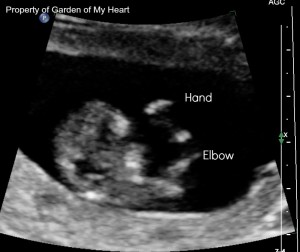As a member of the parenting community, here’s a sampling of things I get to hear and read with great frequency:
-“I would never choose a cvs or amnio because I wouldn’t want to harm my baby.”
-“I would never choose a cvs or amnio because I would never terminate my pregnancy.”
-“I would never choose a cvs or amnio because it wouldn’t matter to me if my child had Down syndrome.”
-“I would never choose a cvs or amnio because I love my baby too much.”
If you’ve ever said these things, or posted them on facebook or a message board, I encourage you to think of how this sounds to the parents who did, in fact, choose one of these procedures.
We didn’t love our children any less than you. We didn’t worry less about their safety. We didn’t worry less about miscarriage. We didn’t want them any less than you did. We made the best decision for our families with the information we had available to us at the time. And while it should be enough for me to simply say that – that it was the best decision we could make at the time – I want to explain why we chose to do it.
We chose CVS with our first viable pregnancy after Rowenna. We were not coerced or shamed into choosing it. In fact, I switched practices with that pregnancy and hadn’t even met my doctor yet. When I had a positive at-home pregnancy test, I simply called the new office and said “I’d like a dating ultrasound so I can get on the books for a CVS.” (A CVS is a time-sensitive procedure.) The day I went for the CVS, I was asked only if I needed more information about my options. No one pushed termination or any other option. It was all very matter-of-fact.
So why did we risk our baby to find out what kind of chromosomes she had? It took me a long time to come to terms with our choice – but only because it ended so horribly. Had she lived, I wouldn’t have batted an eye, wouldn’t have thought twice about it, and would have blissfully went about that pregnancy. In the moment, we had done our research, spoken with specialists at length, and were at peace with our choice.
When I was pregnant with Rowenna, we had a quad screen pop up “positive” for Down syndrome. I basically did no research about what that meant, operating under the assumption that they wouldn’t use the word “positive” if that wasn’t an accurate term for describing these results. Turns out, it’s not, but that’s another blog post for another day. Our doctor had us come in for an ultrasound to check for the “soft markers” of Down syndrome. Finding none, we were told there was “no chance” she would have Down syndrome, no further testing was warranted, and we would proceed like nothing had happened. Since I didn’t know those weren’t actually diagnostic tests, and again operated under the assumption that my doctor wouldn’t make that kind of proclamation unless he knew what he was saying, I saw no need for further research or testing.
Rowenna was born at a teeny, tiny hospital that didn’t even have a nursery. If you wanted to rest, the nurse would just take your baby to the main nurse station and hold her. When Rowenna was born with a heart defect, they could not care for her. They even had to scramble to find someone who was qualified to do the echocardiogram of her tiny heart to find the defect in the first place.
She was put in an ambulance and sent away from me. That haunts me to this day, seeing my baby packed up in an incubator, the first time someone would tell me that they knew how to take care of her in a way I simply didn’t. Running around a hospital room, packing up, ordering food to take with me, having a pump thrust into my hands as I was going out the door. Hubby, scared and alone, driving back to our house to deal with our cats and other things that needed doing – not knowing how long it would be until we came home.
Spending the second night of her life in a Super 8 Motel – the only thing we could afford – while she slept in a NICU we had only seen for 5 minutes before being ushered out and told to come back in the morning. Not knowing better, not knowing we should have demanded to stay with her, not knowing we could demand that.
The next days were a blur of specialists and tests and x-rays and feeding tubes and barely holding her as she slept under the bilirubin lights for jaundice. The cardiologist telling me to put her in day care only if meant literally starving to death if I didn’t go back to work. The tearful phone call to my boss explaining the situation and learning I couldn’t take the leave I needed without losing my job. Losing my job, writing an email to my coworkers to wish them well. Facing an all-of-a-sudden unclear financial future with a medically fragile child, without knowing how long it would be until her surgery.
For many families, a Down syndrome diagnosis does not cause a financial change. For others, it does. I think it is important for our community to acknowledge that some parents lose a job due to the medical care some of our kids need, especially in the first weeks and months of life. Yes, many kids with Ds are born with little to no health problems, but there are many of us whose lives did change. There are some who struggle under the weight of copays and deductibles. We were lucky in that we have good insurance and a state that has a Medicaid waiver, but imagine the debt if we had had copays on the over $400,000 in medical bills Rowenna racked up in just the first 6 months. We were lucky, other families are not.
She was hospitalized at one month for having a cold, in heart failure for months, then required open heart surgery. Her first year of life felt like waiting for the other shoe to drop. If my baby could require a 5 day hospital stay for something as minor as a respiratory infection, what else could happen? Everything was very scary and uncertain in those early days. We like to say that Down syndrome changes nothing, but in speaking with my friends who have typical kids, I’ve yet to hear one show concern that a simple cold could end with a hospital stay. For some of us, certain things are different. (But different doesn’t mean bad, or that Rowenna’s life is worth less.)
So now we have a living child with Down syndrome, the fear of another child ripped from my arms with an at-birth diagnosis, the uncertainty of navigating another first-year-with-Ds, and the knowledge that as a translocation carrier I have a 10% chance of delivering a child with Down syndrome with every single viable pregnancy I have.
Frankly, a CVS was kind of a no-brainer for us. We simply could not be surprised by that experience with Rowenna again, and it has nothing to do with hearing the words “your child has Down syndrome.” It’s the logistics of a NICU stay when your husband has limited leave from work, a toddler at home who also needs care, and your closest family is an hour away – and that family works full time. It’s the logistics of caring for a child in heart failure – the doctor appointments, the round the clock meds, the need to shelter from germs – while raising a vivacious toddler. It’s knowing my re-entry into the workforce (and therefore bringing in more income) would be put off even longer as we work through the medical care required in those first months, and juggle a full schedule of therapy and doctor appointments.
It’s not impossible to make these adjustments at the last minute, but it would be a smoother transition for all of us if we are able to plan ahead. And mentally, emotionally I needed time to prepare.
We had that CVS, and it cost us Clementine. We’ll never know for sure if the CVS simply hurried the natural miscarriage process along, or if she would have been fine without it. (There were some other signs things may have been amiss – she had stopped growing on track, they found a substantial blood clot, and my pregnancy symptoms had magically disappeared in the days before the procedure.) I cannot take that decision back. I cannot change the past, no matter how badly I wish I could. But it was the best decision we could make at the time, and for that, I have to forgive myself.
So all that being said, will we choose CVS again? During Clementine’s pregnancy, the very real fear of her being born with serious medical issues and being taken from me was nearly debilitating. The fear would choke me, and the relief was knowing that at 12 weeks we would get the answers we needed. Down syndrome was in the back of my mind, but it was the health issues that scared me.
This time around, the fear I felt with Clementine’s pregnancy has been barely present. It’s sort of there, kind of simmering in the background, but the fear of losing a fourth baby is the big, ugly elephant in the room. I honestly don’t think I could emotionally survive losing another baby after a CVS. We’ve also had an NT scan (a screening tool, not diagnostic) that showed no early signs of a heart defect. For those reasons, we are skipping the CVS, but what we did choose is non-invasive blood work. In our case, we had the Verifi test done, but there are others available.
There are blood tests on the market that are non-invasive and nearly as accurate as CVS or amnio. Families can learn if their baby has Trisomy 13, 18, or 21, or a sex chromosome abnormality, without fear of miscarriage. They do not yet test for other chromosomal abnormalities so there will continue to be times when a family would still consider invasive testing. (This test was not available to me during Clementine’s pregnancy.)
These tests have been a hotbed of debate in the Down syndrome community. The fear of increased termination for the diagnosis is real. But I embrace these tests. For every momma out there who has felt the crushing blow of loss after CVS or amnio, for every momma whose water broke hours after the procedure and has to live with the guilt – I support these tests. For every family whose baby was whisked away from them, whose baby had a rough and uncertain and surprising beginning – I support these tests. For every family who floundered for days, weeks, or months because the diagnosis was a complete surprise and help seemed hard to find or access – I support these tests.
I also support these tests as they give families weeks or months of time to decide their course of action, versus an amnio which might leave families with just a few days to make this choice. In months you can be truly educated, in days you run on fear and make an irreversible decision. We frequently preach about “fair and balanced information” for families receiving a diagnosis. It’s much easier to deliver that information if there’s time enough to give it, and if the testing decision itself isn’t literally a life-or-death choice. The tests are here, and here to stay – it’s up to us to help craft the message.
We received our Verifi results today. Negative. This baby likely does not have one of the 3 most common trisomies, nor a sex chromosome abnormality. Our baby is also a girl. A sweet baby girl, a little sister for Rowenna.
Does this mean absolutely nothing else could happen? No, of course not. Deliver a child with a disability, and lose 3 others, and you become keenly aware of all the things that can happen during a pregnancy and a delivery. Is it a load off my mind to know we are likely not looking at major medical complications at birth? Yes. It is.
So from here on out it’s celebrate every day I get to be pregnant and dream big about the little girl set to join this family.







5 Responses to Why I Chose a CVS, And Why I Support Non Invasive Testing